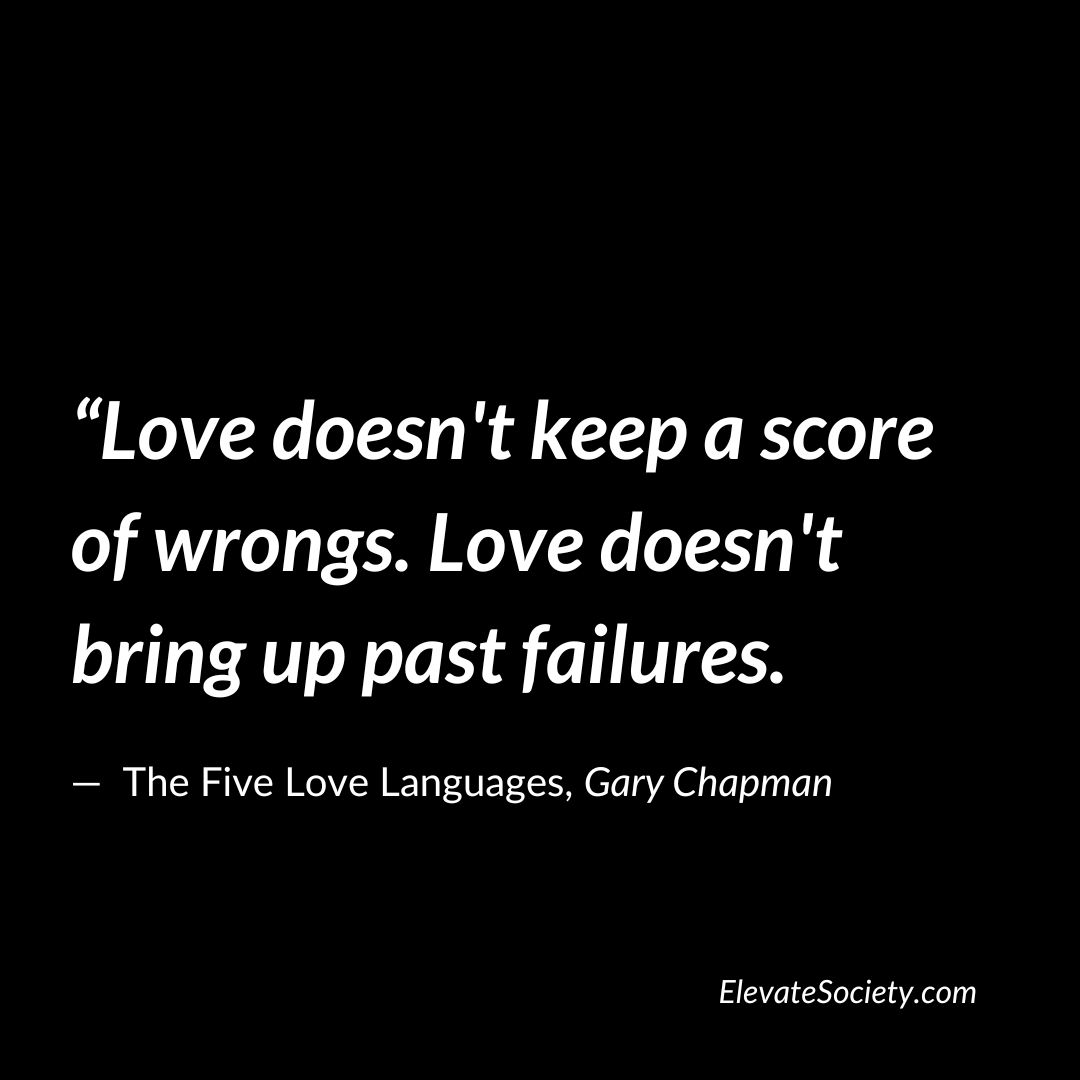Love doesn’t keep a score of wrongs. Love doesn’t bring up past failures.
What's the meaning of this quote?
Quote Meaning: The quote emphasizes the importance of forgiveness and letting go of the past. It highlights the idea that true love is about acceptance, understanding, and forgiveness, rather than holding onto past grievances or mistakes. This quote encourages us to let go of our resentment and focus on building positive relationships based on trust, respect, and kindness. It reminds us that love is not about keeping score or seeking revenge but about extending grace and understanding to those we care about.

Who said the quote?
The quote, 'Love doesn't keep a score of wrongs. Love doesn't bring up past failures.' was said in the book The Five Love Languages (Summary / Quotes) by Gary Chapman. Gary Chapman is a counselor and author who is best known for his book "The 5 Love Languages," which offers insights on how people express and receive love in different ways.
What's the quote's message?
The quote is a powerful reminder of the essence of true love. It is a profound statement that encapsulates the idea that true love should be unconditional and without resentment.
It is quite common for people to keep a score of wrongs or past failures, holding onto grudges and resentments. This scorekeeping can be a destructive force, leading to conflict and bitterness. True love means not bringing up past failures. It means not dwelling on stuff and using it as a weapon.
If we truly love someone, we should be aware of our emotions and destructive force. We should remember that everyone makes mistakes, and it is not productive to hold onto them or use them as ammunition in arguments.
This does not mean we must stay in a relationship. It simply means that it'd be wise to forgive people and if needed, let them go with love.
Is there a historical example that illustrates the message of the quote?
In the aftermath of World War II, amidst a shattered Europe seeking to rebuild and heal, a powerful example of love and forgiveness emerged from an unlikely source: the city of Nuremberg, Germany. The Nuremberg Trials were held to prosecute prominent Nazi war criminals responsible for atrocities committed during the war. It was a moment of reckoning and an opportunity for justice.
One of the most remarkable figures to emerge from these trials was Simon, a Holocaust survivor who had endured unimaginable suffering and loss. Simon's entire family had been murdered in the concentration camps, leaving him scarred physically and emotionally. Despite the pain he carried, Simon chose to embody the transformative power of love.
During the trial, Simon stood before the court and faced one of the defendants, a former Nazi officer responsible for the brutal treatment of prisoners. Instead of seeking vengeance or harboring anger, Simon extended forgiveness and compassion. In a profound act of love, he declared that he did not hold the defendant personally accountable for the crimes committed against him and his family.
Simon's act of forgiveness resonated deeply, transcending the boundaries of the courtroom and touching the hearts of people around the world. It challenged the notion of perpetuating hatred and instead emphasized the healing potential of love and forgiveness. Simon's message was clear: love doesn't keep a score of wrongs, and it doesn't bring up past failures. Love has the power to transcend the darkest moments of human history and pave the way for reconciliation and peace.
His act of forgiveness inspired others to reexamine their own prejudices and grudges, prompting a broader conversation about the importance of forgiveness as a means of healing and moving forward. Simon's profound act of love during a time of immense pain and anguish became a symbol of hope and reconciliation, reminding humanity of its capacity to rise above the atrocities of the past.
This historical example demonstrates that love has the power to break the cycle of vengeance and restore humanity in the face of unimaginable suffering. It teaches us that holding onto past wrongs only perpetuates pain, while choosing forgiveness and extending love can pave the way for healing, reconciliation, and a brighter future.
* Want to explore more inspiring quotes and their meanings? Head over to this quotes page, where I share doses of inspiration through powerful sayings and quotes.
Chief Editor
 Tal Gur is an author, founder, and impact-driven entrepreneur at heart. After trading his daily grind for a life of his own daring design, he spent a decade pursuing 100 major life goals around the globe. His journey and most recent book, The Art of Fully Living, has led him to found Elevate Society.
Tal Gur is an author, founder, and impact-driven entrepreneur at heart. After trading his daily grind for a life of his own daring design, he spent a decade pursuing 100 major life goals around the globe. His journey and most recent book, The Art of Fully Living, has led him to found Elevate Society.




















